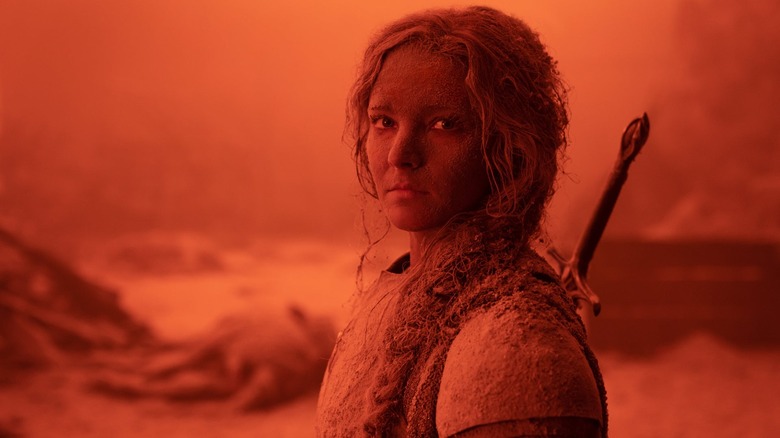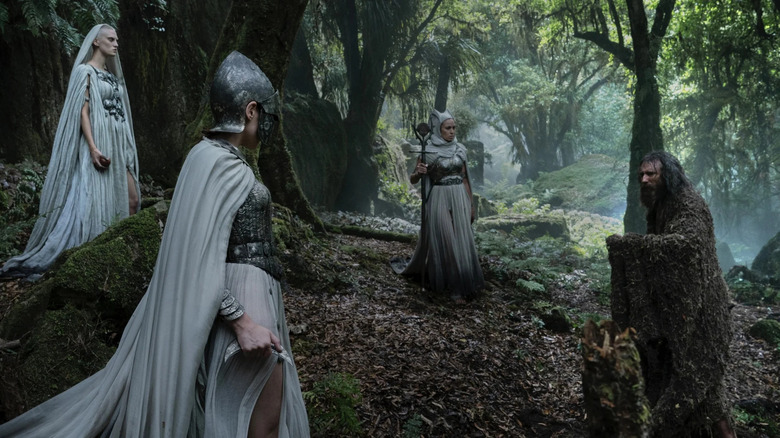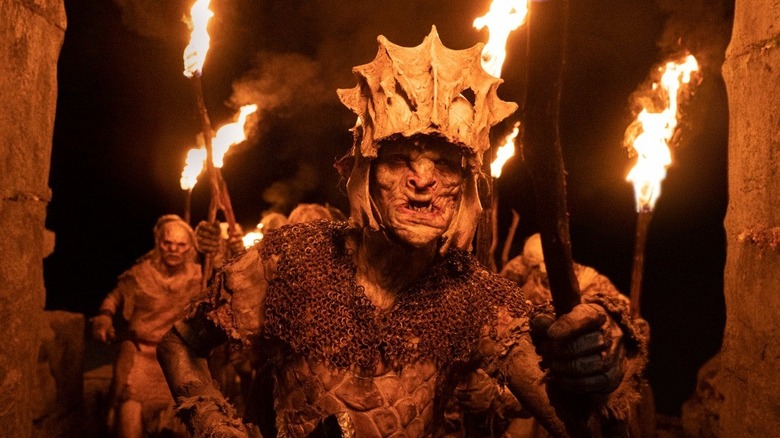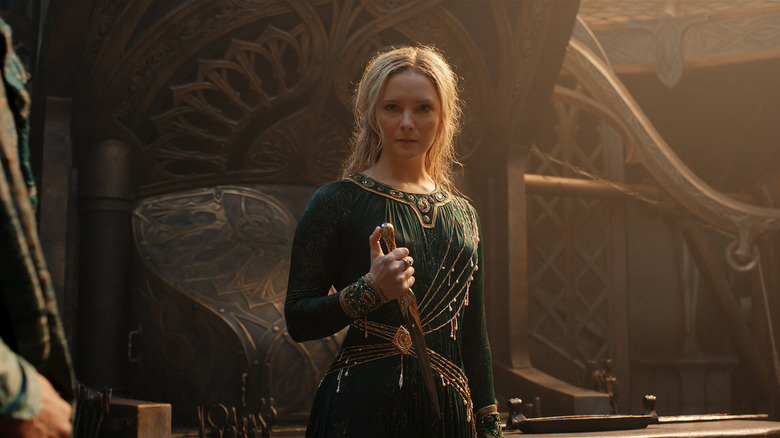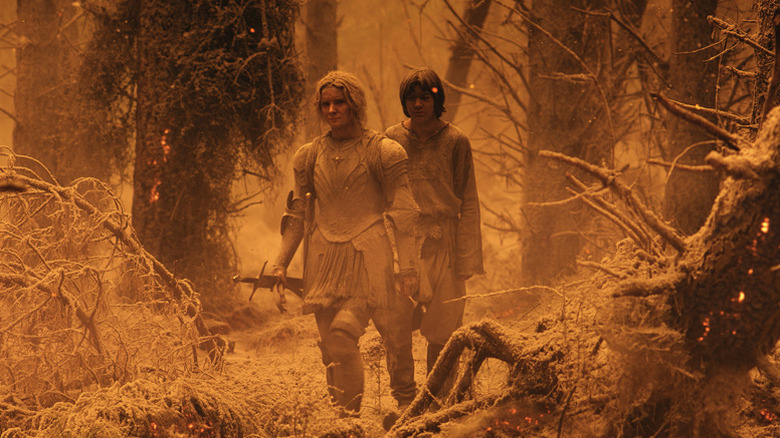The Rings Of Power Supervising Sound Editor Reveals Motifs And Behind-The-Scenes Secrets [Exclusive Interview]
Supervising sound editor Damian Del Borrello worked on "The Lord of The Rings: The Rings of Power" for around two and a half years. When he asked how I was, I was tired, but how can you tell someone who's just completed a 36-month-long audio marathon that you're tired with a straight face? (I still told him.) The scale of the show, visually and audibly, speaks for itself in terms of the epic workload involved in creating a new vision of J.R.R. Tolkien's fantasy world.
After completing his extensive time on the series, Borrello ("Ash vs. Evil Dead") remains delighted and proud of his work. "As a creative who works in sound, the opportunities presented by a show like 'Lord of the Rings' are exciting," he told us. "From a personal perspective, I live in Wellington, New Zealand, and I moved here specifically to work with some of the people who worked on the original 'Lord of the Rings' films." During an interview following the season 1 finale, Borrello told us about us about some of those exciting opportunities.
'I called to you to work through me, to hear my needs and guide my hands'
With familiar elements — say, the screams of the Orcs or the rumblings of Mordor — how did you want to stay in touch with what we expect but also bring something new?
The actual Orc vocals was something that we hit upon the idea fairly early, and it was actually a very simple sort of technical thing, a little bit of pitching. But I think the biggest part of that section of the show was actually we re-voiced all of the Orcs. We replaced all of the production sound because all the Orcs, they look fantastic, they've got all these amazing prosthetics, but they've got all of that stuff in their mouth. So there was an issue with clarity apart from anything else. It also meant that we couldn't really do the audio processing that we wanted on those because those recordings were a little bit too compromised.
We had our fantastic dialogue supervisor arrange all of the Orcs to be re-recorded. And we had a great ADR editor, a guy called Ray Beentjes, who was on the original films, came and cut all that ADR and allowed us to then take that sound a little bit further and give it the pitch shifting and that sort of tonal quality that you hear in the final track.
What about the language for the Elves? How did you help strike that otherworldly sound for it?
I think that's all in the performance. So we had a dialect coach who was working on set with all the actors to train the accents of all the different races, actually. But she was fantastic with the Elvish. As part of a sound design motif, I was talking to her about getting an incantation that made sense for what we were going to use it for. So she gave me this fantastic phrase, which was an incantation mastered by The Stranger in a scene that actually didn't make the cut. But we use that as part of a motif, a layer within all of the magic elements.
So you hear sort of whispers and that's, I guess, conceptually, that's our version of the ring. You know, like in the original films when they put the ring on and they go into the unseen world and they hear the voice of Sauron talking through the ring. So, the big question in our show was, "What does that sound like without the ring?" Because that's the connection between the ring and Sauron, but this all happens way before the ring's even created.
That whisper element in the sound design came from the idea that all magic comes from Ilúvatar, the creator in Middle-earth and in the universe of Tolkien. If you look into the lore, you read into the depths of a website like the tolkiengateway.net, which is what I used — I had that tab open on my computer for two and a half years, and I was always mining that for a bit more information about what we were saying — but if you look into Ilúvatar and look at how Middle-earth was created, it was all created from his thoughts.
And so, the natural extension of that would be, "What is the sound of Ilúvatar's thoughts?" It's the magical mystical whispers. And so we worked closely with the dialect coach to pick that right phrase to use and then extend out how we used it and the different ways we recorded it and processed it. There are layers of it and it changes and develops depending on what's happening with the magic, and whether it's mysterious or whether it's dangerous. So that was a fun way that we used that language.
From the deleted scene, what did The Stranger say that became the motif?
So this was actually one of the fundamental things when we first started was like, "Okay, how do we start to develop this idea?" I can't even remember what the scene was that it was in, but the phrase itself was, "I called to you to work through me, to hear my needs and guide my hands." I'm not even going to try and pronounce that, but basically, it's an incantation. I read into it a little bit as it was The Stranger drawing on the power of Ilúvatar to perform some magic.
'Whenever we see the Orcs, we always hear a little bit of buzzing flies'
What else from that research helped you along the way?
Well, it's about characters. Just because of the way that we were working, because we started right at the very start of the shoot. So my supervising partner, Robbie Stambler, and I, it was the two of us for over a year and we were embedded with the picture editorial department. We were just sort of building up sound effects and premixes to then give back to the picture editorial department, so they can continue to develop with good sounds. From a workflow perspective, we were getting the show in these little bite-sized chunks, which were sequences that were sometimes a minute and a half long, sometimes five minutes long. So it was quite hard to understand the context of what we were trying to design our sounds to.
I'd hear a character name and I'd go, "Ah, okay." I'd jump onto the wiki and go, "So that's Celebrimbor, so he does this and this. The line that he said then is quite important, so let's design a little bit of ambience around that to give it a bit more weight." It is piecing together context, just as a starting point for these sequences, allowing us to elevate all of those performances and give a bit more depth around.
Of course, once we got further down the track, we would be handed over larger chunks of the show. We were working in reels and then we were working in episodes. So we would have to revisit that work. But a lot of the time those little nuggets of information that I got from the wiki would stay in or would become the foundation for a bigger idea.
What sounds did you want to emphasize for certain characters?
Well, we knew the music was going to be huge in this as well. Obviously, Bear [McCreary]'s score is incredible and all of his themes were always going to be the thing that led with the emotion of the character. So the original films were very sort of organic in their sound design, like things sounded very natural. Sometimes people sometimes call those films documentary for fantasy style, you know? We had that in mind all along the way.
So trying to find natural, organic sounds, real sounds, to then use as small motifs to underscore characteristics of character and races. With the Orcs, we came up with this idea around the sound of buzzing flies. The Orcs, they have the skin, then they have to stay covered from the sun because they burn. The idea that they're always a little bit sick, and they're always a little bit smelly, and a little bit crusty. So whenever we see the Orcs, we always hear a little bit of buzzing flies, or if there's an Orc around, then eventually in that scene they come through, we hear flies before we see the Orc — that type of thing.
How'd you handle sound for Sauron and build up to the reveal? Did you want to avoid or embrace audio clues?
A part of the Sauron idea was to not give away, to not even make any suggestion of any one character being Sauron, just so that the reveal is so much bigger and the impact is really good. An interesting part of that is we actually didn't get to read episode 8's script. We had access to all the other episodes, but even as the sequence cuts were coming through, we had no scripts. So we didn't know the reveal in episode 8 until much later. So it wasn't really something we could build in along the way.
How was it working on that reveal sequence? It's trippy, so how heightened did you want to go?
That was such a fun sequence. We actually did a couple of different versions of that as well. There was a version that was very heavy and very dark. We had lots of drone-y, thunderous parts, but then, once the music came in we're like, "Ah, okay. So that's actually not doing that at all and it's actually starting to get in the way of that music." The music was doing such a good job, so we used parts of that to build towards the end of the Galadriel and Finrod scene.
And then, of course, once the raft scene kicks in, it starts to amp up in a big way. Right at the start of that transition into the young Galadriel scene, we built quite a heavy design, but because the music was so light and making a direct reference to episode 1, we really had to pull back on that.
'That sequence with the dagger at the end with the creation of the rings was its death song'
What about the creation of the rings? Music contrasts with sound effects quite strongly there.
Yeah, another early motif, something that we saw in the very first episode, is Galadriel's dagger. There's a very simple sound, and it's a shimmery metallic sound that we created using metal shims and hits and used a bit of processing to elongate it and then we could pitch it and almost use it like music. The dagger seemed important the way they shot it at the start, but it's actually not in the canon — it's not in anything that Tolkien wrote. It's something created for the show, but we recognized that was an important element to emphasize, but also to have a sound that we can use throughout the whole series and be able to manipulate and change depending on the emotional context of how it's used.
So that sequence with the dagger at the end with the creation of the rings was its death song. There are all of those metallic-y elements that are almost slightly wailing, slightly crying. There are all these almost pained, metallic sounds, especially through that melting phase. And then there's a slight element of that on the shots of the rings as well, just to try and tie it together, [since] the rings are made from the dagger.
What were some other sounds from the finale that took extensive manipulation?
Well, I think that in Galadriel's mind sequence with Sauron, they're all locations we've been to, but they are corrupted versions, if that makes sense. A lot of it has to do with our fantastic mixers, Beau Borders and Lindsey Alvarez. We sort of presented original ambiances and elements from the real world version of those scenes. They changed the panning and added reverbs and created an uneasy sense of that same place. We did layer in other elements, but it was mainly to do with the positioning and the treatment of those original sounds.
'Fire is a massive part of the whole season'
In the second to last episode, how challenging was it creating that sense of chaos after the battle?
That was a brutal sequence. Fire is a massive part of the whole season, really, but this is where it becomes more evil-sounding fire, smoldering. Stefanie Ng, who was our dialogue supervisor, did a fantastic job of getting all the crowd, the background crowd, screams and moaning and crying, all that stuff recorded in loop group, just as another layer of a sense of the pain, a sense of the sorrow, a sense of all of that chaos along with the sound of the whole town just crumbling apart.
It was a pretty full-on sequence to work on, but it's one that actually came together quickly because it was so visually striking. When you have all of those elements that are in-camera, all of the ash and a lot of those fires are practical, we could dive straight in and start building. There was a lot of VFX as well, but definitely from the start, that scene was very, very well formed.
Correct me if I'm wrong, but there's never a Wilhelm scream in any of the battles, right?
I don't think so, no.
Was there a debate about it, though?
There was debate, and it was a very dynamic debate. What we ended up doing was, all of the sound team, we're all actually in it in little parts as part of the loop group. We did have our own sort of version of the Wilhelm scream. It's not really a scream, it's actually our first assistant, Andrew Moore, with one specific line that is used multiple times throughout the show. I'm not going to say any more, but that's a little Easter egg for people to check out.
I could tell based on your reaction it was a real conversation about whether or not to have that scream.
It was. It is on every show, especially when there are opportunities in battles or those big action scenes where you can sneak it in, but the decision was made to not include it in this one.
Is it a polarizing scream?
Yeah, I think some people love it, and a lot of other people think that it's just so overdone. I think it's kind of fun, but as a team, we made the decision to not have it in, and that's fine.
"The Lord of the Rings: The Rings of Power" season 1 is currently streaming on Prime Video.
